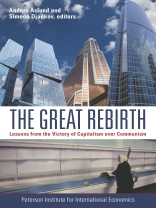The fall of communism transformed the political and economic landscape in more than two dozen countries across Europe and Asia. In this volume published on the 25th anniversary of the fall, political leaders, scholars, and policymakers assess the lessons learned from the ‘great rebirth’ of capitalism and highlight the policies that were most successful in helping countries make the transition to stable and prosperous market economies. Also discussed in this book are examples of countries reverting to political and economic authoritarianism. The authors of these essays conclude that the best outcomes resulted from visionary leadership, a willingness to take bold steps, privatization of state-owned enterprises, and deregulation. Recent backsliding in Russia and Hungary has cast a shadow over the legacy of the transition a quarter century ago, however.
This volume grew out of a two-day symposium of experts and practitioners reflecting on the past, present, and future of reform, held in Budapest, Hungary, on May 6–7, 2014.
Giới thiệu về tác giả
Anders Åslund was a senior fellow at the Peterson Institute for International Economics from 2006 to May 2015. He examined the economic policies of Russia, Ukraine, and Eastern Europe, as well as the broader implications of economic transition. Aslund served as an economic adviser to the governments of Russia in 1991-94 and Ukraine in 1994-97. He is a leading specialist on postcommunist economic transformation with more than 30 years of experience in the field.Simeon Djankov, nonresident senior fellow at the Peterson Institute for International Economics, was deputy prime minister and minister of finance of Bulgaria from 2009 to 2013. In this capacity, he represented his country at the Ecofin meetings of finance ministers in Brussels. Prior to his cabinet appointment, Djankov was chief economist of the finance and private sector vice presidency of the World Bank. In his 14 years at the Bank, he worked on regional trade agreements in North Africa, enterprise restructuring and privatization in transition economies, corporate governance in East Asia, and regulatory reforms around the world. He is the founder of the World Bank’s Doing Business project. He is author of Inside the Euro Crisis: An Eyewitness Account (2014) and principal author of the World Development Report 2002.












